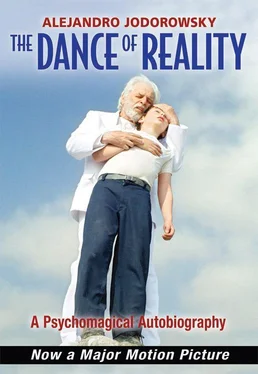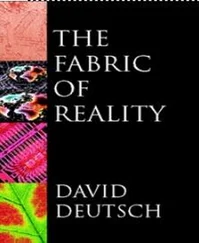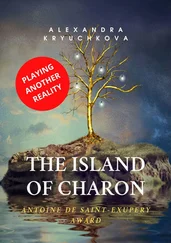“Overcoming my shyness, I began to choose carefully who my father, my mother, my grandfathers, my brothers, my aunts, and uncles should be. All of them, loved or unknown, near or far, were gradually embodied by these strangers. They were truly professional, knew the process of identification very well, and soon, without the least doubt, my family was there. After immersing the room in semi-darkness we all undressed and began the massage. Many hands were placed on my body, gentle, strong, hesitant, affectionate. I was touched with luminous and tender attention. I felt the contact that all the children in the world dream of: the vigilant love of the adult for the innocent. Suddenly, through these people, who became a channel, my real family was present; the spirit of my ancestors was there. The emotion that possessed me was so intense that I felt myself projected into the region of impassivity. From there I saw myself cry and laugh at myself.
“Next, ecstatic at this new consciousness, protected by my family from the assaults of darkness, I decided to take advantage of that window of power. I became the central organizer: I had to rebuild the group into what every family really is, a wonderful space-time-ship sailing the infinite ocean of life in search of the promised Father. I was the captain of that ship! I distributed the roles without hesitation, and they all happily took their places. One was the indefatigable engine, another was the protective hull, another was the radar, another the control panel, and so forth. This fantastic voyage across the universe was a unique experience insomuch as our collective imagination was freed, for a few moments, from the comfortable and illusory rational prison, entering into a marvelous dimension, so subtle, so true, so perfect, that in the end, upon returning to our habitual reality, we rejoiced with the excitement of a crew that has successfully completed an important mission.
“The years have passed, and this moment, far from being forgotten, continues to be a source of inspiration and allows me to remain absolutely certain of the incredible power of love and imagination when they are thus mixed in the crucible of bodily sensation.”
Moebius drew volumes five and six of The Incal with superhuman creative enthusiasm. Making the most of my collaborator’s experience, I had written an adventure in which the main characters, forming a family, combined themselves into a spatial-temporal ship and crossed the universe to find Orh, the Supreme Father.
It seemed important to me to give the same attention to the feet that is given to the hands. These extremities, driven to insensibility by spending most of their time imprisoned in shoes, are keepers of important information by virtue of their receiving the weight of the entire body. With massage the patient can be led to completely experience the consciousness of her feet, made to penetrate deeper and deeper into them with the sensation of touch until she feels her soul. The heel is strengthened in order to prevent retreating from life. The toes are stretched toward the infinite future. The entire surfaces of the feet are tenderly kissed in order to release the child that is a prisoner in them.
Despite these investigations, and many others (for example, massaging not only the body but also its shadow and the objects the shadow touches, such as the floor, furniture, other objects, or another person, treating them all as a unit; experiencing a perfect birth in the arms of a man and a woman, on the “mother’s” belly, protected by the “father,” covered by a warm damp sheet, feeling oneself emerge into life amidst loving touches, simulating development, growth, and finally birth with ease and joy; or massaging the space that surrounds a body, imagining that it is an aura that belongs to it; etc.), I felt that there was still an essential aspect that had not yet been discovered. I began to ask myself, “Who is massaging?” I realized when observing my students that the patients did not offer objective bodies but images, according to how they felt and conceived themselves. Although it seemed incredible, some of them were living without sex organs, others without backbones or without feet, while others were a head from which a sort of fetal body hung. Most of them perceived themselves as their relatives had perceived them. Moreover, the massagers were not massaging with their whole being. Sometimes they would act seductively, sometimes like cold doctors, sometimes like sadistic children, and so on. Their frustrations, complexes, insecurities, and interests slipped into every movement. I concluded that I was not working with beings with a single body, but with many. The vision of one’s body changes according to the “I” that is dominant at the moment.
Recalling my youthful experiences, I began to work on massage teaching the imitation of holiness. The greatest desire of a patient in search of consolation is to be taken in the arms of a saint or a Buddha. However, one who surrenders to such contact must be cleansed, like a sacrificial animal, of all egotism. Someone who can give everything is powerless before someone who can receive nothing. In many cases, the patient suffers from inhibitions or irrational antipathies. Then he or she must be touched like a son or a daughter. That is the secret of the Christlike laying on of hands. If it is difficult to give and the person pushes us away with her hands, we love those hands and start our massage by caressing them. We must respect the defenses and advance with parental love, starting at the fingertips, millimeter by millimeter, with extreme delicacy and total attention, into the heart of the other person, dissolving the tension muscle by muscle, giving sturdy support to each limb so that the patient will never have the impression that a part of her is being neglected, however small that part may be. In order to massage in this way, one must breathe deeply and calmly; one must be at the service of the other person, completely attentive. One must act as an empty vessel with nothing to seek and nothing to impose. One must be a refuge without limits, an infinite and eternal companion, not invasive but discreet, a companion who becomes invisible at the slightest movement of rejection.
However, although this massage is effective at calming, it does not heal the essential wound. In the depths, the patient guards his suffering like a treasure. I thought to myself, “It isn’t fair to abandon someone who can’t receive. As a society, we are all responsible for their ills. Not only the tree is sick, but the entire forest. This string of diseases, this reproduction of harm from generation to generation, has to stop someday. There must be a way to make those without eyes see, to make those without ears hear, to communicate love to those whose hearts are closed.”
Just at the moment when I was in need of some valuable new information, dancing reality put a book into my hands by psychotherapist Catherine Lemaire titled Membres fantómes (Phantom Limbs, published in 1998), with a preface by Gérald Rancurel, a professor of neurology at the hospital of Salpêtrière. The subject of this book is one of the most fascinating mysteries of clinical neurology: the “phantom limb,” a phenomenon whereby the patient continues to perceive the presence of a limb that has been lost. However imaginary it may seem, the phantom limb is very real, practically flesh, insofar as it can be felt and described. Even if it does not exist, it can cause pain. Even an amputated limb imposes itself on the consciousness, continuously or intermittently, for many years in some cases. The subject feels his or her leg or arm as if it were actually there. The eyes see through the phantom, but in the dark it is there again, sometimes larger than ever. Touching it is impossible. The missing part is there, perceived but invisible and untouchable. Not only legs and arms produce phantoms, but also the breasts, nose, penis, tongue, jaw, and anus. Jean-Martin Charcot observed a patient who felt not only the phantom of his hand but also the wedding ring on his finger. Some people who were born without certain limbs, and therefore have no sensory experience of them, also develop phantoms. How? I found the answer in another phenomenon observed by neurologists: some people, when they relax their muscles and lie still with their eyes closed, sometimes feel an immaterial limb in a position different from that of the physical limb. Phantom limbs can exist without amputation!
Читать дальше












